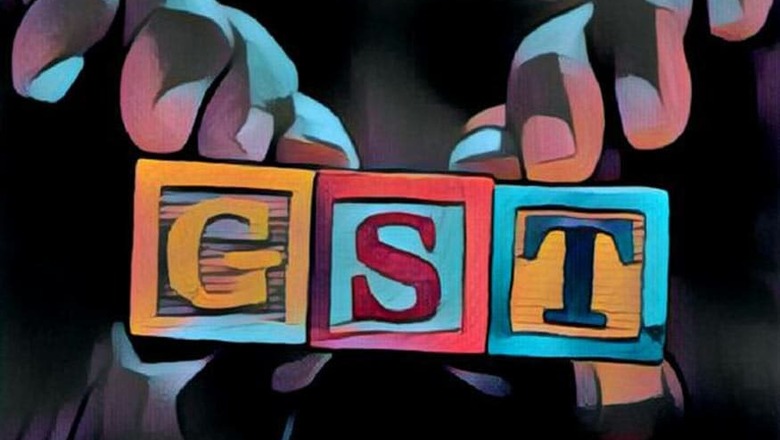
views
The Good and Services Tax or GST is an indirect tax and a one-for-all bucket to different central and state government taxes. Backed by a strong IT backbone of GSTN to facilitate seamless transition, the Good and Services Tax will take effect from July 1 after a special midnight session in Parliament where the government will usher in the new tax regime. Buyers, sellers, vendors, manufacturers, retailers, merchants, tax professionals and banks across India are busy preparing for the rollout.
Here’s a primer to get you ready for the launch date:
One Nation–One Tax
Driven by transparency and accountability, the vision behind GST is to bring the entire nation together under a single umbrella of taxes and create ‘One Market’ where the compliance to indirect taxes is high and compliance cost for indirect taxes low.
IMPACT ON KEY INDUSTRIES
Automobile
The Auto buyers will rejoice as car prices are expected to come down after GST implementation. All automobiles (except tractors) have been put under the common slab of 28%. However, what makes a difference is the cess levied.
- Small Cars (Petrol): 28% + 1% Cess
- Small Cars (Diesel),Motorbikes, Aircrafts, Yachts, Personal Jets: 28% + 3% Cess
- SUVs, Sedans & Luxury Segment, Motor Vehicles: 28% + 15% Cess
- Tractor Parts: 28%
- Tractors: 12%
Real Estate
Although Real Estate has been kept outside the span of GST, the impact on the input materials will bring much-needed transparency in Real Estate sector.
- Cement, Bricks, Marble and Granite Non-Blocks, Paints, Bathroom Fittings, Tubes & Pipes, Wallpapers: 28%
- Iron rods, Pillars, Bamboo Flooring Tiles, Padlocks & Locks: 18%
- Marble and Granite Blocks, Sand Lime Bricks: 12%
- Ceramic Building Bricks, Sand, Crushed Stone: 5%
Healthcare and Pharma
Healthcare industry has been spared from GST. However, the pharmaceuticals will be impacted. Medicines in India are sold without bills. In the GST regime, it would be imperative to generate bills. Here’s a look at the most common pharma products:
- Nicotine Polacrilex Gum: 18%
- Ayurvedic Medicines, Medicines made by mixing two or more constituents, Bandages, Gauges: 12%
- Animal or Human Blood Vaccines, Diagnostic Kits for Hepatitis, Cyclosporin, ORS, Medicines for Malaria, HIV-AIDS, TB, Diabetes: 5%
- Human Blood and its Components, All Contraceptives: Nil
FMCG
After GST implementation, it will be difficult for the retail sector to evade taxes as the complete value chain is to be uploaded and tracked online on GSTN’s portal.
- Aerated Drinks: 28% GST + 12% Cess
¬- Skin Care Products, Shampoos, Detergents, Chocolates: 28%
- Toothpastes, Hair Oils, Soaps, Cookies: 18%
- Ayurvedic Products: 12%
Textile
GST will subsume fringe taxes like Octroi, entry tax, luxury tax, etc and will bring efficiency to the textile industry.
- Man-made fibre, synthetic yarn: 18%
- Apparels priced above Rs 1,000: 12%
- Cotton Textiles, Natural Fibre, all categories of Yarn, Fabric, Apparels priced below Rs 1,000: 5%
- Silk, Jute: NIL
Tobacco Industry
The tobacco industry has been kept under the highest slab rate of GST with additional cess.
- Chewing Tobacco (Without Lime Tube): 28% + 160% Cess
- Chewing Tobacco (With Lime Tube): 28% + 142% Cess
- Unmanufactured Tobacco: 28% + 71% Cess
- Pan Masala: 28% + 60% Cess
- Cigars, Cigarillos: 28% + 21% Cess
- Cigarettes: 28% + 5% Cess
- Beedis: 28%
Telecom
The Telecom Sector has come under the slab of 18%. There is a 3% rise in tax rate for mobile carriers. As per the telecom experts, post-paid users can witness 2-3% increase in their mobile bills while pre-paid users will lose out on talk-time.
e-Commerce
Online shopping through e-commerce portals will be expensive post GST as there will be additional tax you might have to bear to pay to the seller. However the good news is that delivery times will shorten as there would be less paperwork required by the seller to deliver goods in other states within India. On the seller side, returns and cancellation will become difficult for the e-commerce websites after GST. Also, all e-commerce websites, irrespective of their turnover are required to register for GST.
Start-Ups
To pursue its mission of Digital India, Make in India and promote Entrepreneurship, the government has given several upper hands to Start-Ups and Small Businesses. The current threshold of Rs 5 Lakh turnover to get VAT compliant has been raised to Rs 20 Lakh. Businesses with turnover between Rs 20-50 Lakh can apply for composition scheme to get certain other benefits.

















Comments
0 comment